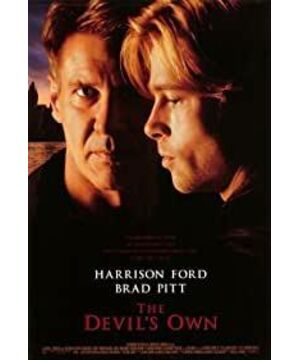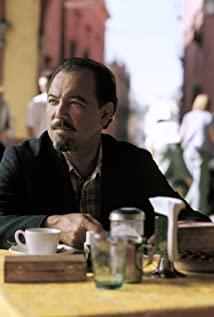When we saw that Pitt came to the United States, we confirmed that the movie had nothing to do with Ang Lee, and W played a guessing game with me. My guess is that Pete will die, he may or may not have made it back to Ireland, but he has to die, and the cop Ford plays doesn't. Although I was mentally prepared for bad Hollywood movies, W also reminded me how many bad movies those big stars in Hong Kong have taken over, but this movie has almost no rhythm in narrative rhythm, story structure, character building, character relationship description, lens movement, and color. I took the same shot, but why did the boys in the cultural center choose such a movie to show us at this time? I was suddenly tempted by the occupation of over-explaining, and couldn't help but free it from a bad movie. It's a way to console myself for the two hours wasted, and it's a way to differentiate myself from the people watching the movie together.
1. Northern Ireland and Tibetan independence.
Is the Northern Ireland problem a British problem or a British and Irish problem? Standing in the United Kingdom, Northern Ireland, and the United States, this question will definitely have different answers. As far as the film itself is concerned, the actions of Northern Ireland represented by Pitt, or extremes, should be denied, but his motivation is indeed worthy of sympathy, even if it is helpless. Therefore, on the first level, the Northern Ireland conflict as a historical issue is seen by the United States as real and worthy of sympathy. The Northern Ireland issue is obviously not an Iraqi issue. The United States has neither oil interests in Northern Ireland nor a clear conclusion due to historical entanglements. Therefore, the United States, as a country, will agree with the British envoy to arrest Pitt in its negotiations with the United Kingdom. , and let it be at his disposal, even by destroying him. That is to say, on the second level, the United States is rational, neutral, self-centered, and helpless. If the United States is completely neutral, then we will not see Pitt's behavior later, and he will be easily sent to the British special officer by the screenwriter. Then, the screenwriter, as the screenwriter representing the American position, why should Pitt play a similar role? A role like a lone hero, even at the expense of destroying the image of the American police? Therefore, on the third level, the United States is sympathetic to Northern Ireland, even condoning it. There is no doubt that there is a limit to connivance. Between political correctness and political wrongness, the United States has no choice but to choose political correctness at the last and most critical moment, at most with an affectionate look back. On the fourth level, we see that as a dangerous man in Northern Ireland, the pursuit of Pitt is carried out by Ford, and Ford's triple identity (Irish, police, ordinary people who are at risk because of Pitt's family) greatly weakens the attitude of the United States ; and Pitt's failure should be attributed to the fragility of Northern Ireland itself.
From "Walking with the Devil", what we see is the attitude of the United States towards the conflict between Northern Ireland and the United Kingdom, or the possible wonderful plot, which was innately castrated by political correctness. So, from this film, can the attitude of Northern Ireland and the British be reflected? Northern Ireland, represented by Pitt, told Ford the story of his childhood, the tragic memory, and the struggle against all the seemingly unreasonable reality became reasonable. Therefore, even as Irish, Ford and the girl who loved Pitt both gave Given Pete's possible new life choices, Pete has no choice but to set foot on the ship home. Just as in Marquez's "The Tavern," because of the force of fate, having to stand up and walk out the door to face the disappointed, fighting, until death, is Pete's destiny. Interestingly, although the director sacrificed the brilliance of the film itself as entertainment and art for political correctness, the lack of British voices in the film inadvertently exposed the hypocrisy of Americans' seemingly neutral political correctness. In addition to being Pitt's opponent in the war, the British in the film, as the main location of the film, are only the British special agent who appeared in the film. His tough attitude made the United States and Northern Ireland stand together and become the The object of America's subconscious opposition, not to mention the film's explanation of the origins of the Northern Irish War. In this way, it is not difficult for us to understand why Pitt is portrayed as a lone hero in the legendary film, and the final failure has a strong elegy color (at the end of the film, the camera moves backward from the boat where Ford and Pitt are, and gradually becomes a distant view, the picture Zhong Ford drove the ship to draw a beautiful arc on the sea).
Is there any connection between the significance of the Northern Ireland issue to the United States and CNN's comment on the Tibet independence incident? If we look at this issue for the purpose of communication, from the perspective of American culture and even Western culture, we will find that problems that are taken for granted in the minds of Chinese people are very likely to become problems for Americans. The uniqueness of Tibet itself and the image of the Chinese government's post-Cold War Western cultural image represented by the CCP are undoubtedly more likely to cause Americans to be inclined than the image formed by the conflict between the United Kingdom and Northern Ireland. read. It is human nature to sympathize with the weak, and it also plays a role in national political ethics. If Tibetan independence and the CCP speak out at the same time, there is no reason for the United States or even the West to sympathize with the CCP’s position. From our point of view, the attitude of CNN and other Western cultures towards China is wrong, but from their point of view, such a misreading, even a deliberate misreading, has its obvious rationality. Therefore, if you refer to "Walking with the Devil", the misunderstanding of China in the United States and even Western culture needs to be corrected, it will take time, and it will require our efforts, especially the disdainful efforts of the Chinese government represented by the CCP.
2. Who killed Pete.
The most brutal murderers in the world are not as powerful as a botched screenwriter. In Walking With the Devil, was Pete killed? I guessed from the beginning that Pete would die because he appeared as a terrorist in the eyes of Western society, and no matter how sympathetic his stance and motives were, he could not convince American society to turn a blind eye to a terrorist. When Pete killed Ford because his friend was about to draw a gun, I knew Pete was doomed, because he killed the American policeman who represented the force of justice, despite all the flaws in this policeman, but, according to Ford's words: " He is not guilty of death." It can be said that for such a politically correct movie, Pitt was doomed from the moment he appeared, and the only reconciliation the screenwriter could do was to choose how to die for Pitt.
Anyone who has seen the movie will probably wonder about the clues Ford represents. What does this Irish policeman represent? His triple identities actually have hidden meanings, but they seem incomprehensible because they are hidden too deeply and they do not show these conflicts from the outside. Ford's identity as an Irish-American police officer, police officer and Irish-American made it logical for Pitt to enter his family, but its more important function lies in his third identity, that is, an American who represents the American spirit and American culture. The police represent the national will of the United States, and the Irish is a more sympathetic position carefully chosen by the United States for Northern Ireland, so as to avoid the unfamiliarity of the United States and Americans in general with the conflict between Britain and Northern Ireland on the other side of the ocean. So why does the movie spend so much time describing Ford's family life and his troubles as an ordinary American? Here, family life and Ford's troubles make the conflict between Northern Ireland and Great Britain go away, and we see everyday life in peaceful America, with joy and trouble. It was Ford who was an ordinary man who expressed the writer's attitude. As a police officer, Ford had to kill Pitt; as an Irishman, his blood ties to Northern Ireland made all his actions questionable; and as an ordinary American, Ford's attitude towards Pitt was closer to that of the United States: the reason why Ford Involved in this struggle, completely passive, he hates disruption to his peaceful life, so he has to act, he needs to kick Pete out of his life. So the police killed Pete, the Irish sympathized with Pete, and the Americans were doomed to drive Pete out of the country—and we might even overstate it that Pete's death and the return of the last ship were only one of the two Yes, only dead Petes, or at least vanquished Petes, are parked on ships returning to the continental United States. Now let’s look at the final scene of the movie. The leisure and quietness in it is even meaningful: the United States has returned to the perspective of a bystander, and life has returned to peace. Although there may be conflicts, it is obviously a conflict with Northern Ireland. It's a world of difference.
In addition to this, we also need to pay attention to another scene in the movie with deep meaning: the war of guns and guns. The reason why Ford's friend killed the thief, according to the movie, was because his friend had been shot by the thief before. In a fit of anger, he shot the thief from behind regardless of the fact that the thief had thrown away the pistol. I can't confirm now if the footage at the time deliberately showed whether the friend saw the gun being thrown. For friends, the only recourse against a thief's gun is to pre-empt it, only to end up abusing this power to conquer fear. Although it was a friend who killed people, it had a major impact on Ford, who represented the image of the American police, and made him consider retirement after lying for his friends. It can be said that this is a lose-lose result. Or to explain the rationale of the friend doing this, the screenwriter specially arranged a family dispute. An immigrant man held a gun at his wife and daughter in the family dispute, and the gun actually went off during Ford's altercation with him. We can imagine that if Ford's skill was a little dull, it is very likely that the two shots would end all thinking. From this perspective, what the friend did is reasonable.
The writers then arranged for a confrontation between friends and Pete. Pete climbed out of the car and pointed the gun at his friend, who subconsciously wanted to draw the gun, but Pete shot without hesitation. We can say that Pete is just protecting himself, and facing the dark muzzle, isn't his friend's action to protect himself? They were both friends of Ford. Originally, they had no conflict on the level of life, but because they were afraid of each other, they attacked first. It can also be said that it was Pete's fear that killed the friend. The last encounter between Ford and Pitt on board, the two of them are like a scene of personal friendship and gang friendship in a Hong Kong police and bandit movie. On the one hand, they sympathize with each other emotionally, and even have deep brotherhood. Dear. John Woo's classic white pigeon and confrontation scene expresses this conflict to the extreme, and in "Walking with the Devil", the relationship between Ford and Pete is not qualified to show such romance because of fear and vigilance. Because of fear, they Had to use their power to conquer fear in the first place, and as a result, they were all shot. If, in the end, Pete was dead, we could say, at least on the surface, that it was fear, fear of the enemy or not, that killed Pete. The screenwriter's three comparative descriptions are not meaningless, so what does he want to say? This reminds people of Ang Lee's expression in "Crouching Tiger, Hidden Dragon": "Crouching Tiger, Hidden Dragon in the rivers and lakes is not in people's hearts." The screenwriter probably wanted to express the conflict between Northern Ireland and the United Kingdom through these two contrasting shootings. On the one hand, there is no need to shoot. The root of force is the heart, the hatred, emotions, and fear of each other, so that both sides point guns at each other at the same time. They originally just wanted to intimidate the other side to protect themselves, but when they saw the dark muzzle of the other side, the huge fear made them pull it. turned off the switch, and the opposite of them, either as innocent as the thief who had thrown the pistol, or as the final confrontation between Ford and Pete, had the same fear, and the same tragic outcome. It's a bit boring to say this: guns can't solve these problems, the heart is the way to solve them.
3. Walk with the Devil
Who is the devil in the movie title? Remember the pre-dinner prayers that come up time and time again, and the devilish parts of the bar mitzvah. If I understand correctly, the people who walk with the devil should be Pete and the people who maintain Pete first, and then Ford who gets involved. In addition to religious meaning, the devil mainly includes people who seek profit from war, such as war and arms dealers, and even Irish judges. If we add to the screenwriter's understanding of the causes of war and their solutions, we can also think that the devil refers to the human heart. It's just that it takes a second look at the movie and some consideration for its discussion of the devil, and I'm obviously not interested in another torture.
If this understanding is correct, then Hollywood has really carried out the vulgar to the end. Isn't this the trick of those ancient Chinese tunes that end elegantly and persuade Bai Fengyi? Even a representative of the mass culture media, Hollywood does not see people all over the world as a stream of people who lead cars and sell pulp. What's more, if your audience are all idiots, who are you going to leave those meticulous efforts? Could it be that you originally wanted to be both elegant and popular, but didn't expect the result to be unflattering on both sides? deserve it.
Looking at this movie from the above analysis, in fact, the screenwriter's needlework is strict, but this does not hide the rough and bad performance of the larger part of the movie, including Pitt's effortless affair, and Ford and Pitt's nighttime The disgusting heart-to-heart talk and the obvious tears on Pete's face. One of the good things about watching this kind of movie is that you find out that your IQ is not as low as you thought, the bad thing is that you have to face those vulgar challenges to your ability to endure, because sometimes their clichés are outrageous In addition, it was horribly perfunctory, and it looked like a broken jar - this somewhat made us see those money-counting fingers and indifferent eyes behind the movie, no doubt, this will greatly Reduce our sense of superiority as smart audiences, and in the end, we are still influenced, occupied, exploited, despised, and discarded without hesitation.
View more about The Devil's Own reviews











